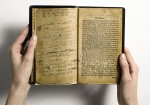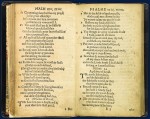 The Bay Psalm Book, the first book printed in what would become the United States, has sold at a Sotheby’s auction tonight for $14,165,000. This is a new world record for a printed book, eclipsing the $11.5 million James Audubon’s Birds of America sold for in 2010. Even so, this astronomical figure is below expectations. The pre-sale estimate was $15,000,000 — $30,000,000.
The Bay Psalm Book, the first book printed in what would become the United States, has sold at a Sotheby’s auction tonight for $14,165,000. This is a new world record for a printed book, eclipsing the $11.5 million James Audubon’s Birds of America sold for in 2010. Even so, this astronomical figure is below expectations. The pre-sale estimate was $15,000,000 — $30,000,000.
There was much excitement surrounding this sale because there are only 11 surviving copies of the Bay Psalm Book, and only six of them still have their title pages. Seventeen hundred copies of the book were printed in 1640 on a press imported from London and operated in Boston by indentured locksmith Stephen Daye. This was a huge number considering the Massachusetts Bay Colony only had an estimated 3,500 families living there at the time for a total population of around 15,000 or 20,000.
So many were published because the entire congregation singing psalms (as opposed to a dedicated choir) was an important part of Puritan worship and the ministers of the colony were unhappy with the psalm books used by the Church of England and the separatist Pilgrims. The former they deemed to be replete with interpolations and added verbiage not in the original Hebrew; the latter they found difficult to sing. So a group of 30 “pious and learned” ministers were tasked with created a new more literal book of psalms to use a hymnal.
 The volume was instantly popular and a later edition continued to be printed well into the 18th century. Because this was a book meant to be used early and often, those original 1,700 copies were hard worn. By the mid-19th century, it was extremely rare and highly sought after by sacrilegiously unscrupulous collectors. By the mid-20th century, Bay Psalm Books were so rare that a 1947 sale of one set a record of its own when it commanded $151,000. That was the last time one came up for public auction until tonight.
The volume was instantly popular and a later edition continued to be printed well into the 18th century. Because this was a book meant to be used early and often, those original 1,700 copies were hard worn. By the mid-19th century, it was extremely rare and highly sought after by sacrilegiously unscrupulous collectors. By the mid-20th century, Bay Psalm Books were so rare that a 1947 sale of one set a record of its own when it commanded $151,000. That was the last time one came up for public auction until tonight.
That copy, purchased by rare book dealer Abraham Rosenbach acting for a consortium of Yale University alumni, is now in the Yale University Library. Eight of the other surviving copies are also owned by libraries, including the Library of Congress and the Bodleian. The last two are actually in the Boston Public Library, but they belong to Boston’s Old South Church (est. 1669). They decided earlier this year to sell the book because they have another even more pristine copy of it and they needed the money to fund their extensive ministries. They obviously have a very positive attitude and don’t appear to be disappointed at all that it didn’t garner the $30,000,000 figure bandied about.
Nancy S. Taylor, Senior Minister and CEO of Old South Church, said: “Old South Church has millions of reasons to be thankful this Thanksgiving. We have re-acquainted America with this amazing book and its extraordinary story. And, we have turned it into fuel for our ministries – from homelessness to housing, from youth violence prevention to elder care, from food insecurity to public education. We are delighted.”
 In a rare break from the endless litany of anonymous private collectors, we actually know who the buyer is and the news is just about as good as it gets. The book was purchased by private equity billionaire and history buff David Rubenstein. He is a philanthropist of the old school and has spent tens of millions preserving history for the public. Last year he donated $7.5 million to restore the Washington Monument after it was damaged by an earthquake in 2011. After buying the only privately-owned copy of the Magna Carta for $21.3 million, he loaned it to the National Archives and then gave them $13.5 million to build it a new custom display case.
In a rare break from the endless litany of anonymous private collectors, we actually know who the buyer is and the news is just about as good as it gets. The book was purchased by private equity billionaire and history buff David Rubenstein. He is a philanthropist of the old school and has spent tens of millions preserving history for the public. Last year he donated $7.5 million to restore the Washington Monument after it was damaged by an earthquake in 2011. After buying the only privately-owned copy of the Magna Carta for $21.3 million, he loaned it to the National Archives and then gave them $13.5 million to build it a new custom display case.
His plans for the Bay Psalm Book are equally civic-minded. He will loan the volume to libraries all over the country (interest in this book was so great when the news broke of the impending sale that it traveled to Philadelphia, Chicago, St. Louis, Cleveland, Houston, San Francisco and Texas, drawing crowds wherever it went) and then will choose one library to place it in on long-term loan.